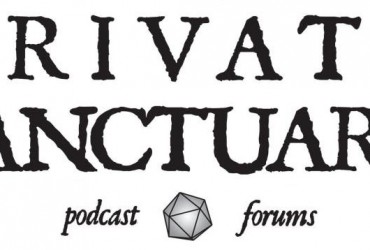Welcome to Guidance, Private Sanctuary’s source for tips and techniques for the Pathfinder Roleplaying Game, written by Everyman Gamer Alexander Augunas. Today, we’re going to be talking about Dex to damage. Again.
Sometimes I don’t think we’re EVER going to see the end of Dex to Damage arguments, folks. You’ll remember that a while back I did an article on Slashing Grace and how people reacted to its implementation, and it seems that such arguments still crop up occasionally, even though its been almost six months since the Advanced Class Guide was published.
In truth, the Dex to Damage threads have always amused me somewhat because its always seemed strange to me that people would get so tied up about whether or not its overpowered for Dexterity to be in control of as much as it is. You know, because no one seems to give the same concern to Charisma.
Charisma, You’re Fired!
Charisma is a very strange stat. Either it does everything or it does nothing. For instance, even if you aren’t a druid, you probably care about your Wisdom because the game’s most important skill (Perception) and one of its most important saving throws (Will) are based off of it. Having a low Wisdom hurts a lot more than, say, having a low Strength or even a low Intelligence. For instance, Intelligence determines your skill points per level AND your bonus in a large number of skills, but those two areas are interconnected. If your Intelligence is low to the point where you start loosing out on skill points, you probably don’t care about having a penalty on Intelligence-based skills because you wouldn’t put one of your diminished-number of skill points in such a heavily penalized skill anyway. But still, Intelligence having skill points at it back makes it higher on the priority chain for most than, say Charisma.
Charisma’s biggest problem is that by default, it doesn’t have much of an impact in combat. By default, just about all you can do with Charisma is demoralize enemies, but having the Intelligence to put ranks in Intimidate matters a heck of a lot more than your Charisma score. The only time where Charisma seems to matter is in builds that force Charisma to get off the couch and get a job. Builds that involve Charisma-based spellcasting classes (sorcerer/oracle/bard) or classes that have special abilities that specifically work off of Charisma (paladin/swashbuckler/bard).
Dexterity doesn’t have this problem: Dexterity is useful no matter what class you’re playing because it modifies two important statistics: Armor Class and Reflex saving throws. Additionally, nothing really ever threatens to replace Dexterity. It is something of a sacred cow status that the ability score shares with Constitution. (Although technically, undead replace Constitution with Charisma for all effects and purposes.)
So, What Does This Have to do with Dex to Damage?
What does it have to do, indeed? It is interesting how we place Dexterity on this double-edged pedestal; that nothing can take Dexterity’s place, but at the same time Dexterity shouldn’t ever be allowed to take anything else’s place. We seem to allow just about every other substitution without much concern; inquisitors can use Wisdom on virtually all Intelligence-and-Charisma-based skills in the right build, and there are plenty of traits and abilities that substitute Charisma for Intelligence (such as the Bruising Intellect trait). But when we look at what is an obviously iconic fighting style (finesse-based fighting), we get a bit edgy and worried.
What makes this even more amusing is the fact that Dex-based characters have a very obvious weakness: feinting. Next time you have the chance, open up your Core Rulebook and read the section on dodge bonuses in the appendices. According to the rules, every dodge bonus in the game shuts down whenever a character is denied its Dexterity bonus to AC. You know that annoying Crane Style monk that’s been annoying you? All of the dodge bonuses granted by that AND his fighting defensively action are nullified by a simple Bluff check.
But of course, another part of the problem is that as designers, we never design charismatic foes that excel at feinting. Instead, we design big, bad brusiers designed to hit often and deal buckets of damage. But imagine how effective a tyrannosaurus, who only has one attack to his name anyway, would be if he could feint an enemy!
At this point, I feel like I’m starting to ramble so I’m going to end with a final thesis statement: Pathfinder juggles around the mental ability scores so often, rendering so many of them invalid for several different classes that in the long run, making Strength not matter for a specific build is not a problem, especially when that specific build requires an outstanding expenditure of resources (feats). Mental ability scores (Charisma and Intelligence especially) get unceremoniously replaced all the time by class features, things that often don’t require any real trade off or sacrifice, such as with the inquisitor’s cunning initiative class feature, or the conversion domain’s 1st level granted power.
So, I think I’ve pretty much said my piece about Dex to damage (and ability score swapping in general). What do you think? Do the amount of resources that go into Dex to damage make the trade-off fair to you, or is the ultimate outcome (the near invalidation of the Strength score) still beat the cost in doing so? What are your thoughts on Dex to damage? Leave your comments and ideas below, and I’ll see you next time on another exciting installment of Iconic Design! Take care!
Alexander “Alex” Augunas has been playing roleplaying games since 2007, which isn’t nearly as long as 90% of his colleagues. Alexander is an active freelancer for the Pathfinder Roleplaying Game and is best known as the author of the Pact Magic Unbound series by Radiance House. Alex is the owner of Everyman Gaming, LLC and is often stylized as the Everyman Gamer in honor of Guidance’s original home. Alex’s favorite color is blue, his favorite Pathfinder Race/Class combination is changeling swashbuckler. Because I like to change things up every once and a while.







“Additionally, nothing really ever threatens to replace Dexterity.”
Except for Charisma:
• Feat: Noble Scion (Scion of War): Allows one to substitute their CHA Bonus for DEX when calculating initiative.
• Oracle of Lore Class Ability: Sidestep Secret: Add your CHA modifier (instead of your DEX modifier) to AC and Reflex Saving Throws.
There have been many times I’ve been building NPCs and wanting to use a Dex to Damage option but I find myself having to spend so many feats to do so that it’s just easier for me to take another class instead of doing what I wanted.
Even then, some classes just don’t get the option to use it out of very niche builds (like Monks with Snake Style to use piercing unarmed strikes).
Whereas, I can build several characters who, with a single dip, can replace many things with their Charisma score.
I believe, in total, you can have Charisma for will saves, AC, Reflex saves, Knowledge checks, initiative and whatever you choose for Versatile performance. I can’t recall everything that does the above, but I’m fairly certain there’s a combination of feats and class abilities that allows for it.
“Slow Clap” stupid swashbucklers and their level to damage and dex to damage nonsense!
I feel like the designers behind 3E and Pathfinder hate dex-based melee characters, and I don’t know why..
Ok, so, let’s look at strength. Strength is not a very useful stat. It affects three things: your carry limit, melee attack rolls, and melee (and some ranged) damage rolls. As soon as you can buy a Handy Haversack, your carry limit doesn’t matter any more, so the only people who care about strength are strength-focused melee warriors (and it’s a secondary stat for archers). It’s a dump stat for everybody else.
On the other hand, those same strength-focused melee warriors don’t really care about dex. Sure, it affects AC and Reflex saves, but your AC will be capped by your armor’s max dex bonus and Reflex is the least important save. It’s not worthless, but strength, constitution, and wisdom are more important for them.
If you can get a bonus to attack and damage from either strength or dexterity, dex is a more useful stat, but not really by a whole lot. I could get behind having a a cost for that… but currently, the cost is Weapon Finesse, Weapon Focus, and Slashing Grace, and it only works for one-handed slashing weapons. That means TWF’ing is out since you won’t get a damage bonus to your offhand weapon, and you can’t use a two-handed weapon, which have higher base damage and let strength-based characters get 1.5x their strength modifier to damage (or 2x with the Two-Handed Fighter archetype).
After spending all of those feats, you’re /still/ behind a strength-based fighter on damage. In exchange, your AC is probably on par with theirs (since you won’t be wearing heavy armor) and your Reflex save is better. Meh. Being limited to one specific type of slashing weapon also means you’re up a creek if your GM isn’t kind enough to give you the specific weapons you need or if you fight anything with DR/bludgeoning or piercing.
You shouldn’t have to spend several feats to be almost as good as another character type who didn’t have to spend any feats at all.
I tried a similar DEX-based house rule the first time I ran a Pathfinder game. DEX applied to all attack rolls, but STR was added to damage, when applicable. This was mostly to represent the hand-eye coordination involved, so that characters who could move quickly and precisely were more likely to hit targets which were also small, and fast. This was also to avoid stat-stacking; P.C.s needed to think carefully about how to distribute their abilities, to prepare for many and varied situations. The barbarian of course complained that he was more under-powered, compared to the wizard and rogue, with better DEX.
I also tried some home-brewed systems to make the point more. Before I’d read about hero points, I used ‘memory’ and ‘luck’ checks, being inspired by the AD&D player’s option books. They worked basically the same as initiative checks, complete with specialised feats to improve them, except that they ran off INT & CHA, respectively. This also led to how bards and wizards were able to remember seemingly insignificant facts which they’d learned earlier, which could now come in handy. Bards, sorcerers, and paladins also seemed to have a charmed life, suddenly being within arm’s reach of the tool they needed at the time, etc.
I really enjoy having races and character classes finding new uses for different abilities and mechanics. Whether it’s dwarves having C.M.D. bonus; anti/paladins adding CHA to saving throws; I try to throw in as much diversity as possible. Does anyone else get a bit tired with hack-and-slash every week?